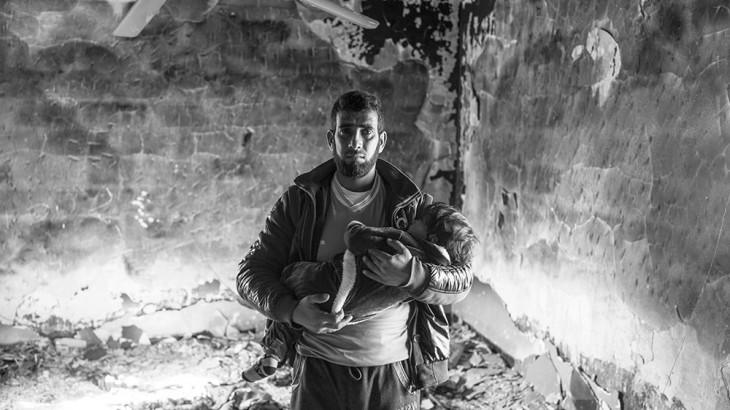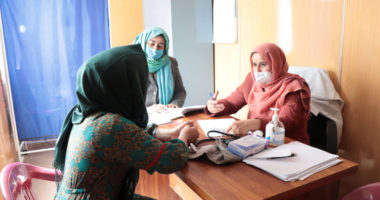The ICRC has published the results of a large survey detailing how people around the world perceive a range of issues relating to war. People on War: Perspectives from 16 Countries highlights the views of 17,000 people from conflict-affected areas, P5 countries and Switzerland. It reveals strong support for the Geneva Conventions but growing indifference to torture. Helen Durham, the director of International Law and Policy at the ICRC, presents the report.
A new survey has been conducted on how people around the world perceive a range of issues relating to war. Results indicate overwhelming support for the belief that wars should have limits. This is indeed heartening news.
There is almost universal agreement that everyone wounded or sick in armed conflict has the right to healthcare, and an overwhelming majority of the people surveyed reject attacks on hospitals, ambulances and health-care workers. Yet the survey also reveals worrying views on torture and civilian casualties and suffering.
The ICRC’s People on War report, released today, is the result of a global survey of over 17,000 people that took place between June and September 2016 in 16 countries. Ten of those countries were experiencing armed conflict at the time and the remaining six were the five permanent members of the UN Security Council (P5) and Switzerland. The survey was carried out by WIN/Gallup International and their partners in the respective countries.
The report comes at a salient time with fighting increasing around Aleppo, the struggle for Mosul continuing and the almost regular attacks on hospitals and healthcare workers around the world. Civilians often bear the brunt of these attacks. People have even begun to question the point and relevance of the rules of war, given their apparent and frequent violation. But as humanitarian workers, lawyers and medical practitioners, we know that international humanitarian law (IHL) does indeed work and has been working for over 150 years.
This is why the ICRC decided to ask the general public for their views. We wanted to know what they thought about behaviour during war; their awareness of the laws of war; their views on migration; and other related topics. We did a similar survey back in 1999 so we are able to make some comparisons between then and now.
Some findings are encouraging. Some are disconcerting.
- People living in countries affected by war believe that the law matters. 67% of people aware of IHL said it still makes sense to impose limits on war.
- The vast majority of people agree that health care must not be attacked – 82% of people surveyed think attacking hospitals, ambulances and healthcare workers, in order to weaken an enemy, is wrong. Among people living in the P5 countries and Switzerland, there is a higher degree of acceptance of civilian casualties and deprivations of food, water and medicine in conflict zones. In P5 countries, 50% of people believe it is wrong to attack enemy combatants in populated areas, knowing that many civilians would be killed; 78% of people living in countries affected by war believe this is wrong.
- Over the past two decades, the public’s attitudes toward torture have shifted significantly showing a greater level of indifference. 36% of respondents believe that captured enemy combatants can be tortured to obtain important military information; this is significantly more people than in the 1999 survey. Only slightly less than half of the people (48%) asked this year believe this behaviour is wrong, compared to 66% in 1999. 16% said they did not know.
- There is a disconnect between public opinion and the policies and actions of States and armed groups. Violations of IHL are continuing but the public believes these practices are wrong.
The results demonstrate the need for a continued debate about IHL, involving not only government authorities, lawyers, humanitarians, but also the general public. We must encourage more engagement on the laws of war so we can highlight what is wrong and refute the idea that crimes can take place simply because they are ‘just a part of war.’ People clearly do not believe in a battlefield ‘free-for-all’. They should be listened to.
We must keep repeating this central tenet: all parties to a conflict must be reminded of their obligations under international law to respect and ensure respect for human life and dignity.
Pursuant to the People on War report, the ICRC makes the following calls to action:
- Support for parties to an armed conflict should depend on their compliance with the law.
- States and armed groups need to show greater political will to find ways to strengthen respect for IHL, including by holding those who violate the law to account.
- The denial of medical treatment to the wounded and sick in armed conflict is a violation of the laws of war. All parties to conflict should bear in mind that the way they behave or treat people, including wounded enemy fighters, matters and can impact the way in which communities recover once the fighting is over.
- Torture is illegal and unacceptable under any circumstances. All parties must respect the law. Torture is an affront to humanity and does not make our societies safer. Those who torture need to be prosecuted and punished.
I invite you to read the People on War report, share it with your colleagues and friends, and discuss the findings and your own views in the Comments section below and on your social media platforms. I hope it will inspire people to think and act.
Helen Durham is Director of International Law and Policy at the ICRC. Follow her on Twitter @HADurhamICRC and join the conversation on the rules of war using #PeopleonWar and/or #GenevaConventions.
![]() Download the report (.pdf)
Download the report (.pdf)
Methodology and full report by WIN/Gallup International






The right to be acused to be investigated under a Democratic population party Estado Libre Asociado de Estados Unidos PR are not in totally in practice. Part of the native of this countries are under international coast inmigration investigation in side de land PR when they are not acused and don’t apply by nothing this kind of international and not democratic investigation system .The criminal investigation and a criminal war seas procedures to the land.The stupid population doing thing’s by there’s own criteria not with the politician law procedures that each countries in law required at international way.The magazines ,investigations center’s, publicity companies and the ignorant population are using from ilicit way theyre’s experimental places to stablish theyre’s law like a ” legal ” in theyre’s terms right to stabish some thing broken the country rights the human right’s.Popuation in PR applying procedures without a legal authorization and without the title a profession hat authorize theme’s to apply a knowledge its a civil obligation in PR this persons at international way and here acting to PR without this country regulation.